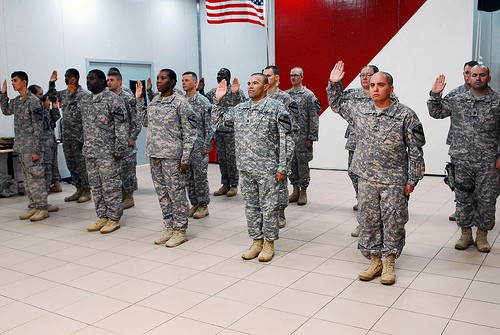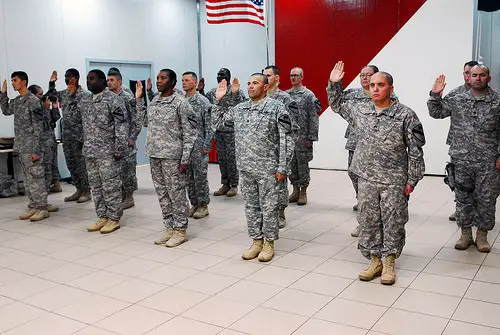Should I Join the Military? 11 Reasons the Military is a Good Career Option
Have you ever thought about joining the U.S. Military? If the answer is yes, then read on. These benefits of joining the military may be enough to persuade you to take the leap. If you haven’t considered joining the military, then treat this article as a primer for some of the benefits which may be available to you if you decide to take that next step. And the benefits can last a lifetime!
11 Reasons to Consider Joining the Armed Forces
Whether you are considering the military out of a sense of Patriotism or duty, for action and adventure, or for a steady job in a depressed economy, there is something for everyone. Here are 10 reasons the military may be a good fit for you.

10 great reasons to join the military
1. Patriotism, defending our nation, and a sense of duty.
Military service is a time-honored way to serve others first. Walter Reuther is quoted as saying,
“There is no greater calling than to serve your fellow men. There is no greater contribution than to help the weak. There is no greater satisfaction than to have done it well.” (source).
This quote sums up what it means to serve. When you join the military, you learn the true meaning of service.
2. Membership into one of the world’s oldest clubs.
Being a military veteran makes you an automatic member in one of the world’s oldest clubs. It is easy to share stories and recollections with other members of this special group of people and can help you gain acceptance, join clubs, find employment, and gain other benefits. Being a veteran is something no one can ever take away from you.
3. Jobs in any economy.
The US has experienced a difficult economy over the last few years, including high levels of unemployment, rising costs, and the outsourcing of many jobs. If you are looking for employment, consider the military, which continues to offer jobs for those who are qualified medically and academically, and who do not have an extensive criminal record.
4. Pay and benefits.
A new second lieutenant starts at over $36,000 a year plus full benefits, not including added monthly allowances of up to $3,000, depending on where he or she is stationed.
An enlisted person starts at around $20,000 a year plus full benefits, not including added monthly allowances of up to $1,500 depending on where he or she is stationed.
Enlistment and re-enlistment bonuses can be over $20,000. After serving only 3 years, some nuclear trained enlisted members in the Navy receive bonuses of $90,000 for re-enlisting. Student loans can be relieved by up to $65,000. The military is also one of the few places where you can get a full pension after serving 20 years or more.
Military retirement pay can reach 50-75% of the average of your final three years base salary (for the legacy High 3 retirement plan). In some instances, you can receive more than 75% of your base pay in retirement.
The new Blended Retirement System (the retirement plan for all members who join after January 2, 2018) offers a slightly different retirement multiplier with matching Thrift Savings Plan contributions of up to 5% of your base salary. The TSP is like a civilian 401k plan.
5. Full medical coverage for you and your family.
Military members are immediately eligible for full health care benefits for themselves and their immediate family members as soon as they enter the service, and if you stay through until retirement, you and your family can take these benefits with you when you leave the military. These health benefits extend to immediate family (e.g. spouses and children, and sometimes dependent parents). You may also be eligible for temporary military healthcare benefits after you leave the service.
6. Skills and training.
The military provides advanced technical training in a variety of career fields and also offers opportunities for additional training when you are off-duty. Many military members are able to attend college courses that are often paid for by tuition assistance. You can use your training opportunities to advance within your career field, earn certifications or degrees, or prepare yourself to transition back into civilian life.
7. Leadership opportunities.
Military leadership is a great way to get your resume on top of the pile for your next career. If you were to hire someone, would you want to hire someone with proven skills and experience and a degree, or someone right out of high school/college? Give me the experienced professional any day of the week! (More tips for creating your post-military resume).
8. Travel opportunities and vacation time.
The military has installations all around the world and pays for you and your family to get there and back. Your off-duty time is yours and you are free to travel and see the world. The military gives you 30 days of paid leave per year, not including weekends and federal holidays.
The military also has several resorts around the world, including the Hale Koa resort in Hawaii, Shades of Green at Disney World in Florida, and resorts in Japan, Germany, and South Korea. Most major military installations also have base lodging (military hotel), where you can stay on a space-available basis for less than the cost of an off-base hotel.
To top it off, you may be able to jump on a military hop and fly for free if there are available seats. A military hop is a scheduled military flight that may take on passengers on a space-available basis (also known as Space-A). These tickets are either free, or a very minimal charge (such as $5, or the tax charged at the airport). It’s an inexpensive way to see the world!
Benefits After Leaving the Service
Reasons to join the military extend beyond your initial time in the service. There are many veterans benefits that are available to prior military members for long after they leave active duty or reserve service.
9. Education opportunities after you leave the military.
The new GI Bill pays veterans who served at least 36 months a monthly living stipend and full tuition to pay for college after they leave the military. Depending on how long the service member commits, this Post-9/11 GI Bill can be transferred to spouses and children.
10. Buy a home with no money down with a VA Loan.
The Veterans Affairs office offers veterans a way to purchase a home with no money down through the VA Loan. This makes it easier to purchase a home while you are serving, or after you have left the service.
11. Military retirement benefits are worth millions.
Military members receive a lifetime pension based on the average of their highest three years of base pay. Military retirees who are in the High 3 Retirement System receive 2.5% of their base pay for each year of service. So 20 years of service would equate to a pension worth 50% of their highest 3 years of base pay (25 years would 62.5%, 30 years would be 75%, etc.).
Members who are participating in the new Blended Retirement System (BRS) use the same calculations, except that you would use a 2.0% multiplier instead of 2.5%. So a retirement at 20 years would be 40%, 25 years would be 50%, and 30 years would be 60%. However, there are two big additions: the first is matching TSP contributions of up to 5% of your base pay, allowing you to have portable retirement benefits when you leave the military, even if you don’t reach retirement. The other is a Continuation Pay Bonus, which is a mid-career cash bonus for extending your service commitment.
Example retirement value:
An officer with 20 years of service, who earns over $100,000 per year, could retire with a pension of over $48,000 per year for life in his or her 40s and start a second career. Imagine earning over $4,000 per month for the rest of one’s life, starting at age 42. This equates to an accumulative pay of $480,000, $960,000, $1.4 million in 10, 20, and 30 years, respectively, in addition to having full health care coverage and an income from a second job, if desired. (Oh, and those numbers don’t account for the annual cost of living adjustments (COLA) which increases your monthly pension each year).
Enlisted members earn somewhat less than commissioned officers. However, their pensions are based on the same formula and receive the same cost of living increases each year. So you can easily run the numbers and get a rough approximation of potential retirement benefits. For example, a $2,500 a month pension is worth $30,000 per year. That would be worth $300,000, $600,000, or $900,000 over 10, 20, or 30 years.
When you add in COLA, it’s easy to see 30 years of pension payments are worth $1,000,000 or more. And that doesn’t include your other retirement benefits, such as military medical care and more.
Learn more about retirement benefits:
What are the Downsides?
But wait… isn’t the military dangerous?
One major reason many people don’t consider the military is the perception of a high mortality rate. This is primarily caused by the media. The reality is many military specialties are no more dangerous than their civilian counterparts. Your branch of service and your career field will go along way toward determining the risk you will be exposed to.
Military members may be eligible for VA service-connected disability benefits if they are injured or become ill during their military service. Receiving a VA disability rating makes the veteran eligible for lifetime disability compensation benefits.
In the unlikely event of a service member’s death, the military or the VA provides a lifetime of benefits for your survivors. The surviving family is given an immediate $100,000 death gratuity benefit, a $400,000 lump sum life insurance benefit (if the member opts into the life insurance), social security and indemnity monthly payments for years, and the transferability of many VA benefits. The military member’s time served is not taken for granted.
What else do I need to know?
Well, that’s a broad question! The best recommendation I have is to speak with some current or former military members to get an idea of their experiences. Keep in mind that everyone has a unique experience, so it is your job to read between the lines. Also, understand that each branch of the military is different. So an Army veteran from 20 years ago would have an entirely different perspective than someone currently serving in the Navy.
Once you have enough information, set up an appointment with a recruiter. They can walk you through your career options, the available benefits, and answer any questions you may have.
Serving in the military is not for everyone, but it does offer many tangible and intangible benefits.


